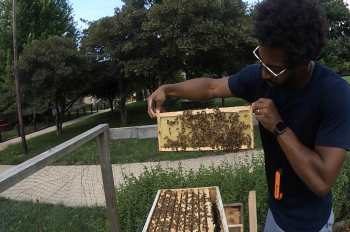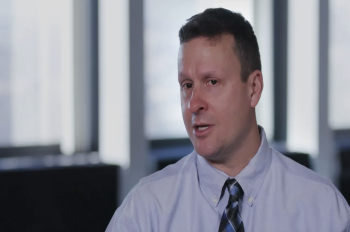Illinois Tech Team Applies Pressure to Competition at Chainless Challenge
A group of students from Armour College of Engineering’s Mechanical, Materials and Aerospace Engineering Department were named the overall winners of the 2016 Chainless Challenge. The goal of the competition is to design a human assisted, fluid powered, vehicle traveling on two, three, or four wheels to compete in events including a sprint race/team relay, efficiency challenge, and time trial race, among others.
Illinois Tech has been participating in the competition for six years. The team is comprised of project leader Carl Ferrario (ME, 5th year) and team members, Angel Dimitrov (ME, 5th year), Emanouel Milanov (ME, 4th year) and Nathan Ruhl (AE, 4th year). Their faculty mentor is Associate Professor of Mechanical Engineering, Matthew Spenko.
The event started a decade ago after engineers at Parker Hannifin had the idea of challenging college students to design and build a hydraulic system to drive a bicycle – minus the chain. The company provides funding for travel and provides components to the students to use at no cost. This year the National Fluid Power Association became involved and will be taking over the handlebars of the competition in future years. Alongside Illinois Institute of Technology, teams from Cal Poly San Luis Obispo, University of Illinois Champaign Urbana, Western Michigan, University of Akron, Purdue University, Cleveland State University, and University of Cincinnati converged on an abandoned airfield in Irvine, California to compete.
Most teams undertake the challenge as a capstone design project their senior year with the support of their entire class, while the team from Illinois Tech competes as a special project, outside the regular curriculum. They build and improve their bikes each year with the funds awarded to them at Chainless Challenges in years prior.
In 2014, when asked about their future plans for the bike, Ferrario warned “Prepare for a stripped down machine that focuses on weight and simplicity as a main design aspect.” The team delivered on that promise this year. Their bike weighed a measly 63 pounds, almost half as heavy as the next lightest bike in the competition.
They were able to shed weight by separating the drive circuit and regeneration circuit in their system. “This allowed us to eliminate a lot of components and reduce hose lengths,” said Milanov. “The team also focused on build quality, using higher quality and lighter weight components than in years past,” Ferrario adds. These components allowed the team to rely on the bike’s frame to support the hydraulic components instead of large bolt-on attachments.
Over the last few years, the team’s innovative bike has always been a fierce challenger in the design competition, but has fallen short during the races. “We made sure our bike was done before the deadline so that we could do a lot of testing on it,” says Milanov, “We also made sure our design was tailored for two of the three races so we can maximize the amount of points we won.”
The efforts made to improve the bike’s design paid off. The team was named the overall winner after they won first place in Reliability and Safety, Cost Analysis, Innovation, and the Time Trial. The simple lightweight design helped the team finish the endurance race 10 minutes ahead of their nearest competitor and set a track record for fastest average speed during the time trials.
Experiences like the Chainless Challenge help expose students to lessons outside the normal curriculum. “I have learned a lot about making a hydraulic system work.” says Milanov, “(the competition) gave me knowledge that your average straight out of college engineer does not posses.” Ferrario adds, “My knowledge in hydraulics has obviously been enhanced, but I learned a lot about project management as well”
The competition has lead to jobs for the team. In 2014, team members Joshua Buck and Sean O’Halloran accepted positions from Parker Hannifin offered to them at the Competition. This year, Ruhl was approached by executives from Bimba Manufacturing offering him an internship with the company as he is finishing his degree next fall. Ferrario is currently interviewing with several manufacturing and aerospace companies and anticipates an out-of-state move when he accepts a position. Milanov is interviewing with manufacturing companies in the Chicago area. Dimitrov has accepted an offer to begin work at Omron Corporation where he interned last summer.
With all four team members graduating, the team’s faculty mentor, Matthew Spenko, is currently seeking students who are interested in carrying the torch for next year’s challenge. If you would like to join the team, email Dr. Spenko via mspenko@illinoistech.edu.




